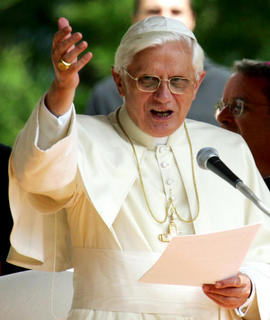 "Every Sunday, in the celebration of vespers, the liturgy proposes to us the brief but profound Christological hymn from the Letter to the Philippians (see 2:6-11). It is the hymn, just heard, which we consider in its first part (see verses 6-8), which delineates the paradoxical "emptying" of the divine Word, who lays aside his glory and assumes the human condition.
"Every Sunday, in the celebration of vespers, the liturgy proposes to us the brief but profound Christological hymn from the Letter to the Philippians (see 2:6-11). It is the hymn, just heard, which we consider in its first part (see verses 6-8), which delineates the paradoxical "emptying" of the divine Word, who lays aside his glory and assumes the human condition. "Christ, incarnated and humiliated in the most infamous death, that of crucifixion, is proposed as a vital model for the Christian. The latter -- as affirmed in the context -- should have "the same attitude that is also yours in Christ Jesus" (verse 5), sentiments of humility and selflessness, of detachment and generosity.
"Undoubtedly, he possesses divine nature with all its prerogatives. But he does not interpret and live this transcendent reality as a sign of power, of greatness, and of dominion. Christ does not use his being equal to God, his glorious dignity and his power as an instrument of triumph, sign of distance, expression of crushing supremacy (see verse 6). On the contrary, he "emptied" himself, immersing himself without reserve in the miserable and weak human condition. The divine "form" ("morphe") is hidden in Christ under the human "form" ("morphe"), that is, under our reality marked by suffering, poverty, limitation and death (see verse 7).
"It is not a question therefore of a simple clothing, of a changeable appearance, as it was believed happened to the gods of the Greco-Roman culture: It is Christ's divine reality in an authentically human experience. God does not appear only as man, but becomes man and is really one of us, he is truly "God-with-us," not content with gazing on us with a benign look from his throne of glory, but enters personally in human history, becoming "flesh," namely, fragile reality, conditioned by time and space (see John 1:14)."
--from the Wednesday audience, 1 June 2005

No comments:
Post a Comment